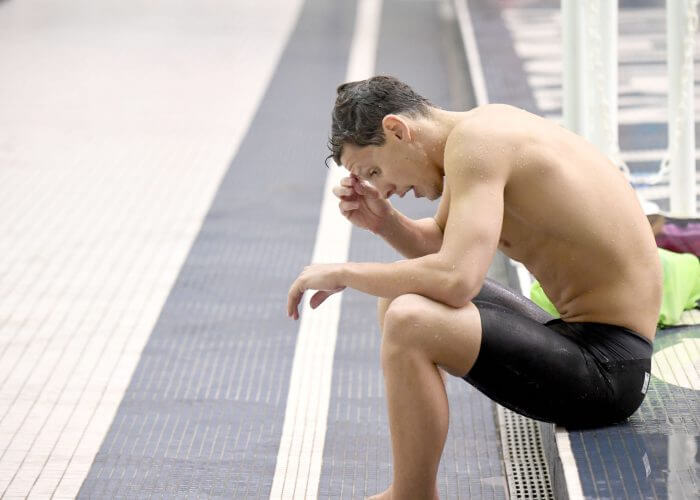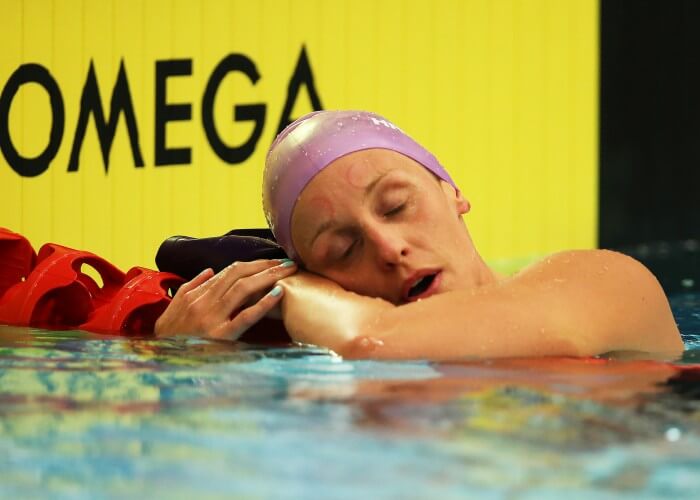How Anemia is Hurting Swimmers

By Norah Hunt, Swimming World College Intern.
For many athletes, being perpetually tired is just a way of life. Training is intense, school has its demands, and often there are simply not enough hours in the day to check everything off the to do list. However, there is a distinct difference between feeling lethargic on a Thursday afternoon after three days of doubles, and having chronic fatigue that affects every aspect of athletic performance. Many athletes, especially females, find themselves so tired that sleeping and relaxing more does not seem to have any effect on their energy levels, and they cannot perform their sport to the best of their ability.
There are many reasons why this over exhaustion may take place, but one possible explanation is an iron deficiency, which according to Nancy Clark, author of Sports Nutrition Guidebook, can occur in over 50% of young female athletes. Iron deficiency can lead to anemia, which causes over fatigue, irritability, loss of endurance, frequent injury, and poor appetite. But, what exactly is iron deficiency anemia? And how can it be treated?

Photo Courtesy: Delly Carr / Swimming Australia Ltd.
What Is Iron?
Iron is considered an essential nutrient, which means that it must be obtained from either diet or supplements. It is a crucial component of the hemoglobin of red blood cells, which are responsible for carrying oxygen to the muscles for energy production. An iron deficiency can be caused by an insufficient diet, but it can also be caused by an increased demand for iron through rigorous exercise, or through iron loss due to injury.
Obviously, athletes are at a higher risk of depleting their iron stores and developing anemia because continuous exercise, especially endurance based, uses so much iron that it is hard for the body to keep up in production. Iron is also lost in sweat, which can be a deceptive comfort for swimmers. Despite doing the majority of our exercise in a pool, we still sweat a substantial amount, which greatly reduces the iron stores in our body.

Photo Courtesy: Ian MacNicol
How to Increase Iron Supply
The best way to combat iron deficiency anemia is to simply incorporate more iron rich foods into the diet. The RDA amount of iron is 15 milligrams per day, but athletes that undertake a particularly aerobic sport, such as swimming, probably need slightly more. Iron is plentiful in animal based products such as red meat, poultry, and fish, as well as plant based products such as fortified cereals, nuts, legumes, and some green vegetables such as spinach. However, the absorption rate, or the body’s ability to convert the iron into a usable substance, is quite different between the two sources. Plant based sources of iron have an absorption rate of around 5%, whereas animal based iron sources have an absorption rate of about 15%. Therefore, although it is possible to be vegetarian or vegan and maintain sufficient iron supplies, it is much more difficult and requires a much more conscientious effort.
The other way to increase iron supply is to take vitamin supplements. However, one should never take these supplements without the approval of a doctor. Too much iron in the bloodstream can cause scarring in the stomach and organ failure, as well as a weaker immune system.
When it comes to iron deficiency and anemia, the only surefire way to know if one has the condition is to have bloodwork done by a doctor. Many times fatigue and exhaustion are a result of overtraining, and it is so easy to misdiagnose anemia. There is a fine line between too much and too little iron, and doctors are the only ones who can safely tell athletes where the line should be drawn.
All commentaries are the opinion of the author and do not necessarily reflect the views of Swimming World Magazine nor its staff. All swimming and dryland training and instruction should be performed under the supervision of a qualified coach or instructor, and in circumstances that ensure the safety of participants.




Catherine!
Susan Garcia yikes
Our team doctor suggested an iron supplement with an acid. We settled on one that was iron with vitamin C for our young ladies, and it virtually eliminated the problems with anemia.
Murron
Iron can bind you up and deplete calcium be careful
Never seen that many women swimmers with osteoporosis ~ probably more the gain in body fat, after stopping weight training. Supplements are a good alternative source. 🙂
Karly Rose
It’s the worst!!
Shannon Stefani
Manon
Becca Flack
Rare filet mignon.
Bert Sonnenschein dit kennen we 😉
Janelle E Hughes
Murron
Alistair Moss this explains a lot for me??
Iron is parte of the Hemoglobin… and Vit C is id good for absortion… but, for the Hemoglobine construcition our body needs Vit B9 and Vit B12 too… so you need to take care all your nutrition. Vit B12 is only naturally in animal based food…. or vegetal foods added with this vitamin…
Best regards!!